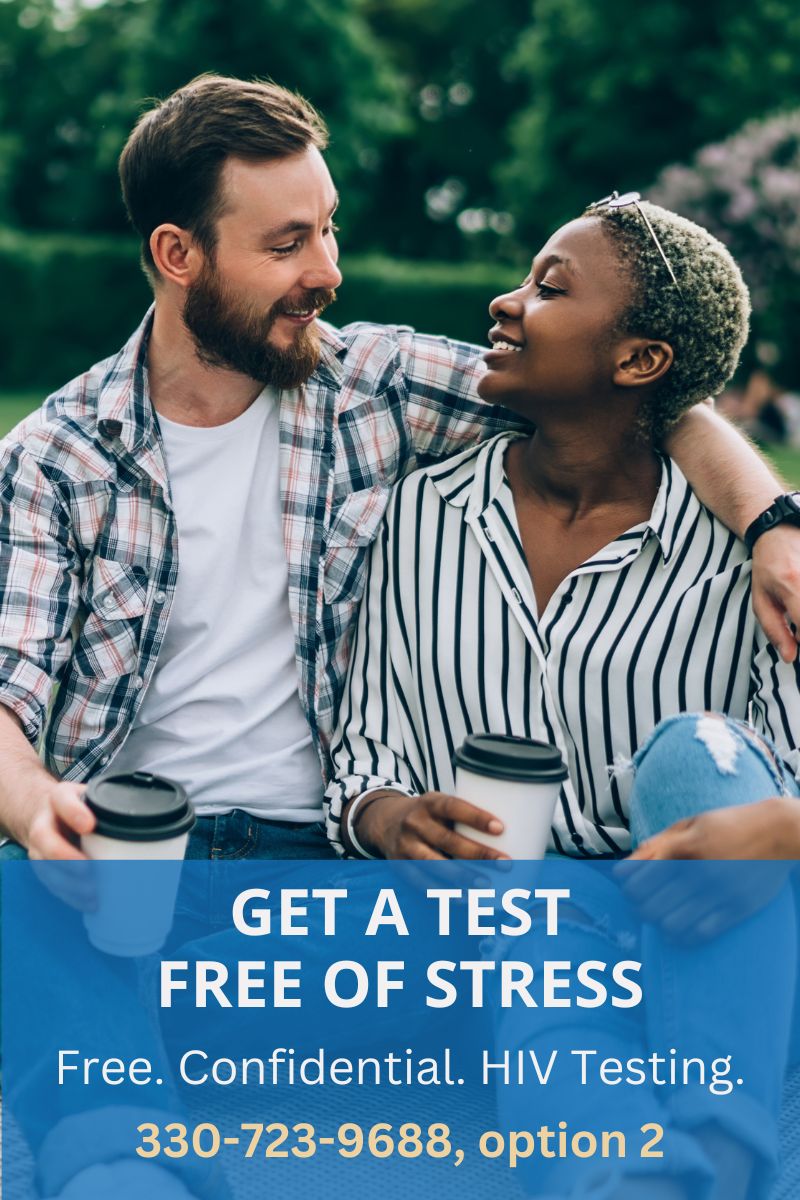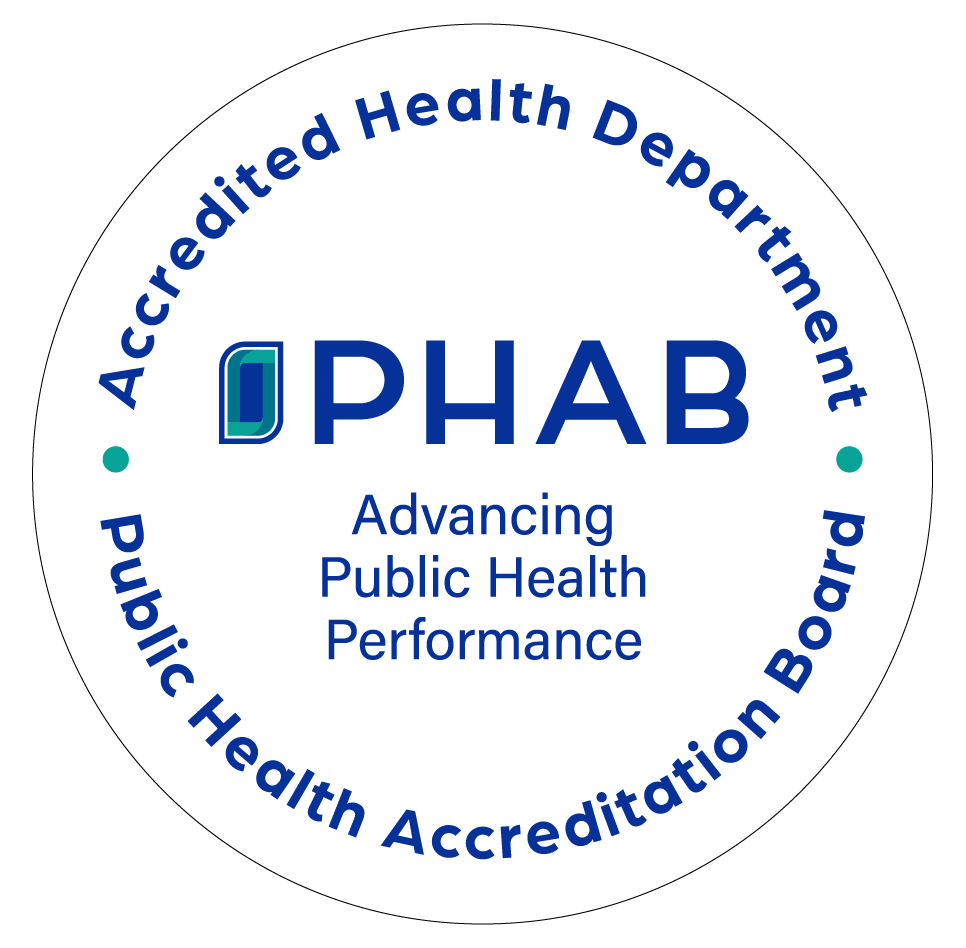Take Control—Know your HIV Status—Get Tested
Get a test free of stress. Call to schedule 330-723-9688, option 2.
- Human immunodeficiency virus (HIV) is a virus that weakens a person’s immune system by destroying important cells that fight disease and infection.
- If HIV is not treated, it can lead to acquired immunodeficiency syndrome (AIDS). In the United States today, nearly 1.1 million are infected.
- Anyone of any age, race, or gender can be affected; however, some groups of people in the United States are more likely to get HIV than others.
- Certain factors such as being sexually active or using drugs and sharing needles can increase the likelihood of contracting the virus.
- About 1 in 10 new HIV diagnoses are attributed to injection drug use or male-to-male sexual contact.
- The Centers for Disease Control and Prevention (CDC) recommends that everyone ages 13 – 64 get tested for HIV at least once as part of their routine health care.
- No effective cure exists for HIV but with proper medical care, HIV can be controlled.
- Getting tested is the first step to finding out if you have HIV. If results are positive, you can live a long, healthier life by getting proper medical care and taking prescribed medications. You also lower the chances of spreading HIV to others.
- Safe Sexual Practice
- Choose sex that is less risky than anal or vaginal sex. There is little to no risk of getting HIV through oral sex.
- You can’t get HIV from sexual activities that don’t involve contact with body fluids (semen, vaginal fluid, or blood).
- Learn more about how HIV is and is not transmitted.
- Use Condoms the Right Way Every Time You Have Sex
- Condoms are highly effective in preventing HIV and other sexually transmitted diseases (STDs), like gonorrhea and chlamydia.
- Use water-based or silicone-based lubricants to help prevent condoms from breaking or slipping during sex.
- Learn the right way to use an external condom(sometimes called a male condom) and an internal condom (sometimes called a female condom).
- Safe Injection Practice
- The best way to prevent HIV through Injection Drug Use is deciding not to inject drugs.
- Talk with a counselor, doctor, or other health care provider about treatment for substance use disorder, including medication-assisted treatment.
- Find a Treatment Center
- findtreatment.gov
- Substance Abuse and Mental Health Services Administration
- 1-800-662-HELP (4357)
- Never Share Needles, Syringes, or Other Drug Injection Equipment
- Use new, clean syringes and injection equipment every time you inject.
- Many communities have Syringe Services Programs (SSPs) where you can get new needles and syringes and safely dispose of used ones. Find a Syringe Services Program (SSP) near you.
- Some pharmacies sell needles without a prescription.
- If you do not have easy access to a syringe disposal site, follow our step-by-step guide to safely dispose of household used sharps. Additional guidance on what to do with used sharps in Ohio is available, along with disposal site locations.
- The best way to prevent HIV through Injection Drug Use is deciding not to inject drugs.
- PrEP and PEP
- PrEP (Pre-exposure Prophylaxis) is medicine people at risk for HIV self-administer to prevent getting HIV from sex or injection drug use.
- PrEP reduces the risk of getting HIV from sex by about 99% when taken as prescribed. Although there is less information about how effective PrEP is among people who inject drugs, we do know that PrEP reduces the risk of getting HIV by at least 74% when taken as prescribed.
- PEP (Exposure Prophylaxis) reduces the risk of developing the HIV virus if prescribed within 72 hours of exposure to a source of HIV.
- Contact the Medina County Health Dept. at 330-723-9688 (option#1) to schedule an appointment with a Health Care Provider to determine if PrEP/PEP treatments are options for you.
- Additional information can be found on the CDC PrEP website.
Who should be tested?
According to the Centers for Disease Control and Prevention (CDC), everyone between the ages of 13 and 64 should get tested for HIV at least once. If you are pregnant or planning to get pregnant, get tested as soon as possible to protect your baby. Knowing your status gives you powerful information to keep both you and your partner healthy. If you are pregnant knowing your HIV status can keep your unborn child healthy.
People with certain risk factors should get tested more often. If you engage in any of the following behaviors, you should get tested at least once a year:
- You’re a man who has had sex with another man
- You’ve had anal or vaginal sex with someone who has HIV
- You’ve had more than one sex partner since your last HIV test
- You’ve shared needles, syringes, or other drug injection equipment (for example, cookers)
- You’ve exchanged sex for drugs or money
- You’ve been diagnosed with or treated for another sexually transmitted infection
- You’ve been diagnosed with or treated for hepatitis or tuberculosis (TB)
- You’ve had sex with someone who has done anything listed above or with someone whose sexual history you don’t know
Where can you get tested?
- If you would like to meet with a healthcare provider to discuss STI screenings (in addition to HIV screening), PrEP, and family planning, call 330-723-9688 (option 1).
- If you are only interested in free HIV screening, call 330-723-9688 (option 2) to schedule a confidential appointment.
Visit the CDC HIV Testing website for more information on HIV testing (types of tests, the window period, finding a testing location, understanding a negative result, understanding a positive result, sharing your test result).
- The sooner you are aware of your HIV status the sooner you can take steps to a healthier YOU
-
-
- If you test in a community program or take an HIV self-test and it’s positive, you should go to a health care provider for follow-up testing.
- If you test in a health care setting or a lab and it’s positive, the lab will conduct the follow-up testing, usually on the same blood sample as the first test.
-
- Immediate support and access to care will be provided.
- Goals of successful treatment
- HIV Treatment as Prevention
U=U (HIV Undetectable = Untransmittable)
- HIV Treatment as Prevention
- Fact sheet: HIV Testing: What You Need to Know
- Regional Resources
- State Resources
- National Resources
- CDC HIV Basics
- Monkey Pox information:


